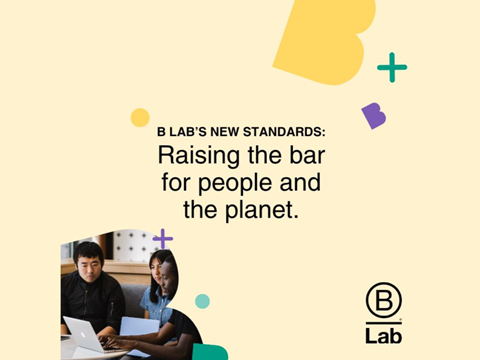
B Lab has revealed seven new standards for B Corp Certification, including clearly defined, science-based sustainability targets, transparently monitored environmental performance, and meaningful action to help both people and the planet.
In a move away from cumulative point scoring, B Lab has introduced its Impact Topics in hopes of bolstering the success of the B Corp movement. It pushes B Corps to ‘manage their impact holistically while increasing transparency and clarity for the public’, thus ‘raising the bar for all businesses’.
One of the impact topics is Climate Action, in which B Corps must help limit global warming to 1.5°C, as per the Paris Agreement, with a definitive action plan. Larger companies must include greenhouse gas emissions and validated science-based targets.
Another is Environmental Stewardship & Circularity. Certified companies should weigh up their environmental impacts and take definitive action to lessen them, both in their own operations and across the value chain.
Purpose & Stakeholder Governance requires B-Corps to align with a defined purpose and make decisions in line with stakeholder governance; governance structures should be created to monitor purpose, social, and environmental performance.
Similarly, Government Affairs & Collective Action calls upon companies to back policies that make social and environmental improvements in pursuit of systemic change. Larger companies must share their country-by-country tax reports for public reference.
Other measures focus solely on social justice. Companies must take stock of Human Rights implications in their operations and value chain, taking definitive steps to avoid violations.
Meanwhile, Fair Work underlines the importance of incorporating worker feedback into company-level decisions. Workers must be provided with ‘high-quality’ jobs, ‘positive’ workplace cultures, and fair wages.
Finally, Justice, Equity, Diversity & Inclusion mandates inclusivity and diversity in the workplace; B Corps must ‘contribute meaningfully’ to ‘just and equitable communities’.
B Lab has integrated data and methodologies from SBTi, GRI, Fairtrade, and other certification schemes, sustainability frameworks, and data reporting requirements into its new standards. In doing so, it expects to help businesses navigate ‘increasing regulatory complexity and mounting pressure to retreat from climate and social justice initiatives’ by ensuring benefits for all their stakeholders.
However, B Lab emphasizes that the new standards require B Corps to keep improving their environmental and social performance, meeting three- and five-year milestones of ‘meaningful progress’.
“At a time when other leaders are stepping back, business must drive progress,” says Clay Brown, co-lead executive at B Lab Global. “This isn’t merely an update; it’s a complete reimagining of business impact to respond to the challenges of our time. B Lab’s new standards can serve as a roadmap for leadership on social and environmental issues when needed most.”
Judy Rodrigues, director of Standards at B Lab Global, continues: “After four years, two public consultations, and 26,000 pieces of feedback from businesses, the public, and experts, we are confident that the new standards are clear, ambitious, and truly capable of raising the bar for businesses worldwide. We look forward to collaborating with our community as they embrace these new standards and create momentum for systems change.”
“European companies have been and still are committed to leading the way in using business as a force for good,” adds Juliette Caulkins, managing director at B Lab Europe. “These new standards provide a clear and credible path for businesses and align with global frameworks and expectations—turning ambition into action and paving the way toward a more inclusive and sustainable economy.”
The new standards are set to serve as an open-source blueprint and can be accessed for free via the B Impact app.
Other sustainability-minded certifications came to light last year, including CERREC’s ‘first and only’ certification mark for recyclable cardboard and paper packaging. It is intended to combat misleading environmental claims and ‘greenwashing’ in the packaging sector via randomized recyclability testing and an instant link to product information via QR code.
The Generalitat Valenciana also worked with FEDEMCO, the Spanish Federation of Wooden Packaging and its Components, to expand its certification mark for eco-designed, 100% recyclable wooden packaging. Designed to align with national and European packaging and packaging waste standards, the certification informs suppliers, manufacturers, packers, distributors, consumers, and recyclers that the certified pack can be recycled.
Gartner also published a survey revealing that almost half of supply chain organizations have formal diversity, equity, and inclusion objectives in a 22% increase between 2022 and 2023. Nevertheless, 43% of organizations reported higher attrition rates.
This year, a joint statement has been released by EUROPEN, FoodDrinkEurope, Cepi, and Cosmetics Europe, among others; it urges EU policymakers to clarify the Green Claims Directive’s substantiation and verification requirements, loosen its transition period, and reconsider its rules on hazardous substances.
If you liked this story, you might also enjoy:
The ultimate guide to the Packaging and Packaging Waste Regulation in 2025
How are the top brands progressing on packaging sustainability?
Everything you need to know about global packaging sustainability regulation in 2025
The key to increasing the use of reusable packaging in supermarkets














No comments yet